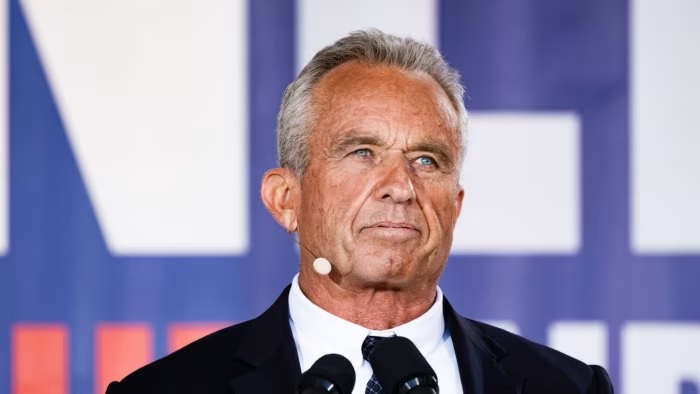Robert F. Kennedy Jr. stated on Saturday that a Trump administration would advise communities to eliminate fluoride from drinking water, a shift from longstanding public health recommendations.
Fluoride, a naturally occurring mineral, is endorsed by dental professionals for its cavity-prevention benefits at regulated doses. The CDC refers to community water fluoridation—the practice of adjusting fluoride levels in drinking water—as a “cornerstone strategy” in cavity prevention and one of the “10 great public health interventions of the 20th century.”
However, health agencies caution that prolonged exposure to excessive fluoride can lead to health risks, and opponents like Kennedy have campaigned against water fluoridation. To mitigate risks, the EPA has set a maximum concentration of fluoride in drinking water. Kennedy claims that under a Trump administration, this maximum would be set to zero on day one.
“On January 20, the Trump White House will advise all U.S. water systems to remove fluoride from public water,” Kennedy posted on X. He described fluoride as “an industrial waste associated with arthritis, bone fractures, bone cancer, IQ loss, neurodevelopmental disorders, and thyroid disease.” He added that Trump and Melania Trump aim to “Make America Healthy Again.”
Kennedy’s statement has drawn sharp criticism and raised concerns among experts about his views on public health, given his frequent opposition to scientific consensus on issues like vaccine safety. In response, Trump campaign senior adviser Danielle Alvarez said, “President Trump has received a variety of policy ideas and is focused on Tuesday’s election.”
Currently, over 200 million Americans, or roughly 75% of the population, have access to fluoridated water. Since 1950, when federal officials first supported water fluoridation, it has remained a cornerstone of public health policy. In 1945, Grand Rapids, Michigan, became the first city worldwide to fluoridate its water supply.
Public health experts differentiate between the benefits of topical fluoride in oral care and the potential risks of ingestion, especially with high doses, which some studies suggest could have neurotoxic effects. To address a condition called fluorosis, which can cause white spots on teeth, officials reduced recommended fluoride levels in drinking water in 2015.
In August, a federal agency found “moderate confidence” that higher fluoride levels might be linked to lower IQ in children, based on studies involving concentrations about twice the recommended limit. In September, a federal judge cited this finding, requiring the EPA to further regulate fluoride due to the risk it poses to children. “EPA’s own expert agrees that fluoride is hazardous at some level of exposure,” U.S. District Judge Edward Chen noted, although the court did not definitively conclude that fluoridated water is harmful to public health.
Since 2015, the recommended level for fluoride in U.S. drinking water has been set at 0.7 milligrams per liter. Previously, the level was up to 1.2 milligrams per liter, adjusted after evidence linked higher concentrations to risks like severe enamel fluorosis, increased bone fracture rates, and skeletal fluorosis—a condition that weakens bones. The World Health Organization has established a safe limit of 1.5 milligrams per liter, while the EPA caps it at 4 milligrams per liter.
Kennedy has claimed that Trump promised him authority over the Department of Health and Human Services (HHS) and the U.S. Department of Agriculture (USDA) if he wins the White House. “I stand ready to help him rid the public health agencies of their pervasive conflicts and corruption and restore their tradition of gold-standard, evidence-based science,” Kennedy told The New York Times.
The Trump campaign has clarified that no decisions have been made about Cabinet positions. “No formal decisions about Cabinet and personnel have been made, however, President Trump has said he will work alongside passionate voices like RFK Jr. to Make America Healthy Again by providing families with safe food and ending the chronic disease epidemic plaguing our children,” Trump campaign national press secretary Karoline Leavitt said.
Trump recently told supporters at a rally that he gave Kennedy the freedom to work on health policies if he joins his administration, saying, “He wants health, he wants women’s health, he wants men’s health, he wants kids, he wants everything,” although he indicated that energy policy would remain off-limits.
 Telegram is where we really talk. Don't miss out!
Telegram is where we really talk. Don't miss out!






